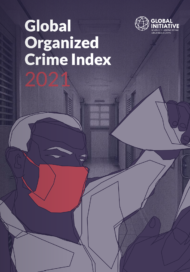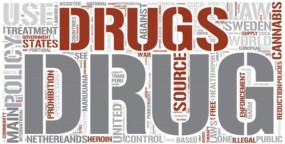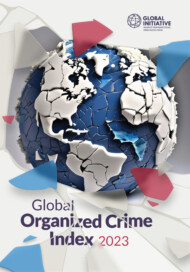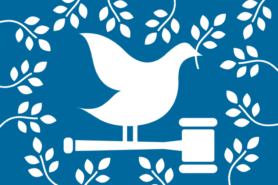Posted on 23 Nov 2021
INTERPOL, The Global Initiative Against Transnational Organized Crime (GI-TOC’s) key partner in the ENACT project (Enhancing African Capacity to Combat Transnational Organised Crime) is currently meeting in Istanbul for its general assembly. At the meeting, members of INTERPOL’s Executive Committee will be elected, including vice presidents, who, together with the president, represent Africa, Asia, Europe and the Americas.
Nigeria’s Assistant Inspector General of Police, Garba Baba Umar, is a candidate for the vice president position representing Africa. Nigeria is of strategic importance to regional and global security, and the illicit economy. Insurgency; human trafficking and smuggling; arms trafficking; the narcotics trade; illicit financial flows; piracy; illicit plastic-waste flows; wildlife trafficking; illegal fishing; crude-oil theft; illegal mining; and counterfeiting are just some of the transnational organized crime types converging in West Africa, where the GI-TOC recently established a regional observatory of illicit economies.
Umar is head of INTERPOL’s National Central Bureau in Nigeria. He holds master’s degrees in law and criminal justice, and international relations and strategic studies. He spoke with journalist and GI-TOC Network Expert Emmanuel Mayah in Abuja.
Why is it important for Nigeria to be represented on INTERPOL’s Executive Committee under vice president?
The country’s vast geographic terrain, its huge population, its ocean wealth, its multiplicity of natural resources, its robust human capital and the size of its market confer on Nigeria the highest stake in any equation in sub-Saharan Africa. Instability or conflict in any part of the continent invariably produces an aftershock in Nigeria. And environmental factors, like the drought in Sudan, can precipitate undesirable consequences in the form of forced migration to Nigeria, with its accompanying security challenges.
Large economies all over the world attract transnational organized crime groups, and Nigeria is no exception – from drug cartels in Latin America to counterfeiting rings in Asia, arms traffickers, cyber criminals, sea pirates and terrorist groups trying to incubate new cells, so Nigeria must constantly keep watch over its airports, seaports and land borders. It is therefore important for Nigeria to be visible in the forums where global security is discussed and policy decisions are made.
Meanwhile, Nigeria’s vast oil and gas resources make the country a choice destination for foreign investors, whose sustained confidence in its economy has continued to make the country the largest in Africa. Nigeria therefore has a lot it must protect, including local and foreign investments
But there is a history to Nigeria’s aspiration. The country has long contributed to regional peacekeeping efforts. It is this same sense of responsibility as a regional power that Nigeria attaches to global policing and collaboration – in this case, INTERPOL membership, its active participation and its domestication of protocols. Nigeria has the institutional capacity to amplify not only its own voice but those of other African countries in a grouping of nations such as INTERPOL.
What would you count as highlights of INTERPOL’s achievements in your country?
In January 2019, the National Central Bureau’s cybercrime unit arrested and recovered US$574 150 swindled by a Nigerian internet fraudster who impersonated a famous American film producer through a social media platform. The Bureau also arrested a Nigerian who had hacked into Ghana’s military database and diverted around US$82 857, which was recovered.
The Bureau is currently investigating a case of fraud in which a suspect impersonated the administration of a Telegram chat room, stole the private keys to the crypto wallet of a victim and transferred around 3 billion South Korean Won in cryptocurrency assets. The suspects have been identified and efforts are moving apace to arrest them. Meanwhile, the cryptocurrency in the suspects’ wallets was blocked and the Bureau has written to Binance [the cryptocurrency exchange company used by the suspect] to return the assets to the victim.
And in September 2020, INTERPOL coordinated the arrest of two Nigerians linked to a €15 million COVID-19-mask fraud scheme. The duo were key players in a non-delivery fraud scheme that targeted German health authorities.
Has INTERPOL served Africa well in its fight against transnational organized crime? What should the organization be doing differently?
It would be harrowing to imagine the vulnerability level that would face any African country if you took INTERPOL out of the picture. Take Nigeria, for example, and particularly the border management security 1-24/7 extension. The Bureau has succeeded in connecting three major law enforcement agencies in Nigeria, granting them access to INTERPOL databases: the Economic and Financial Crimes Commission, the Nigerian Immigration Service and the Nigerian Navy. There has also been tremendous progress to connect additional agencies to the network, such as the Nigerian Financial Intelligence Unit, the National Drug Law Enforcement Agency and the Nigerian Maritime Administration and Safety Agency.
There are similar initiatives in countries across Africa, such as INTERPOL’s Support Programme for the African Union and the African Cyberthreat Assessment Report 2021, which was produced as part of the African Joint Operation against Cybercrime. The report gives key insights into cybercrime in Africa and is helping countries in the continent understand the most prevalent threats and formulate a coordinated regional response to cybercrime.
INTERPOL is proactive, always looking to the future. I cannot think of what the organization should be doing differently.
What are the most important emerging trends in organized crime that INTERPOL should be looking out for?
The top five threats identified by the African Cyberthreat Assessment Report 2021 are online scams, digital extortion, business email compromise, ransomwares and botnets.
In the future, the menace of online criminal gangs will make the activities of terror groups and bandits pale in comparison. I am particularly worried about the potential rise of notorious ransomware crime families, who attack private and business targets and public institutions by blocking access to their computer files and networks, and then demand big ransoms for restoring access.
The attention of these criminal groups might soon shift to Africa, with attacks targeting key infrastructure, such as transportation and logistics, telecommunications, manufacturing, energy, banking, airlines and hospitals.
How has technology changed the methods of organized criminals? Is INTERPOL equipped to respond?
As technology becomes more cutting edge, organized crime groups become more sophisticated. Technology has given birth to new crime phenomena. Criminal networks can connect and coordinate operations in far-away countries in real time. For example, the €15 million COVID19-mask-fraud scheme involved organized crime cells in Nigeria and the Netherlands, and wire transfers in Germany, Ireland, the Netherlands and the UK.
INTERPOL is well equipped to respond. In this particular operation, it coordinated financial crime and intelligence units and banks in several countries to intercept a number of wire transfers and recover down payments already made to the fraudsters.
Is INTERPOL integrated enough into the broader multilateral system and with non-governmental actors?
In July 2021, former Norwegian National Police Commissioner Odd Reidar Humlegård took up his post as INTERPOL’s new Special Representative to the United Nations. INTERPOL’s UN office was established in 2004 to identify areas for enhanced cooperation between the two organizations, as INTERPOL provides a global framework for cross-border police cooperation across its 194 member countries, all of which are also members of the UN.
Cooperation between both organizations is enshrined in UN General Assembly and UN Security Council (UNSC) resolutions, especially in terrorism and human trafficking issues. Both bodies combine their capacities in the form of Special Notices issued to alert law enforcement of individuals and entities subjected to UNSC sanctions. In addition, INTERPOL’s seven Global Policing Goals are aligned with the UN’s 2030 Agenda for Sustainable Development. We must continue to use every available opportunity to enhance this multilateral relationship.
On the relationship with non-governmental actors, take the ENACT programme, of which the GI-TOC, INTERPOL and the Institute for Security Studies are consortium partners. The GI-TOC has regional observatories across the continent, so this programme is an example of ground-breaking non-governmental joint action.
INTERPOL’s cooperation with non-governmental actors has also found robust expression in cybercrime investigations. When INTERPOL deployed Operation Cyclone in Korea, it did so with help of information provided by private partner companies.
INTERPOL Red Notices are being used by some states to target dissidents. To what extent does this undermine INTERPOL’s credibility as a crime-fighting organization?
A Red Notice alerts police worldwide about internationally wanted fugitives, as criminals can flee to another country to evade justice. We are also talking about people that pose a threat to public safety. In 2020, INTERPOL issued 11 094 Red Notices.
Between 2019 and the last quarter of 2021, our National Central Bureau arrested and repatriated a number of fugitives to countries such as China, Austria, Italy, Chad and Ghana, and extradited fugitives from Dubai and Niger. All were placed on an INTERPOL Red Notice but none was being persecuted for political or religious reasons. Two Nigerian fugitives were former civil servants accused of corruption. They were extradited from the United Arab Emirates and Niger at the request of the Economic and Financial Crimes Commission.
What has prepared you for this challenging position for which your country has put you forward as candidate?
I have professional and managerial skills acquired over 30 years in national and international police duties. Before becoming the head of Nigeria’s National Central Bureau, I was INTERPOL’s Police Commissioner in Nigeria; Director Inspector General of the Police Special Task Force on Terrorism and Heinous Crimes; Director of the Analytical Tracking and Interception Centre; and Assistant Commissioner of Police in Kaduna.
Under my watch, INTERPOL commended Nigeria for being the first and only African country to have fully automated its Stolen and Lost Travel Documents database. By successfully uploading 150 000 stolen and lost travel documents in the database, Nigeria was ranked as Africa’s first country to record such success. I was also in charge of operations in two of Nigeria’s most volatile states, Bauchi and Anambra, which experienced insurgency and terrorism. I also take a cosmopolitan view of policing, with emphasis on respect for human rights.



